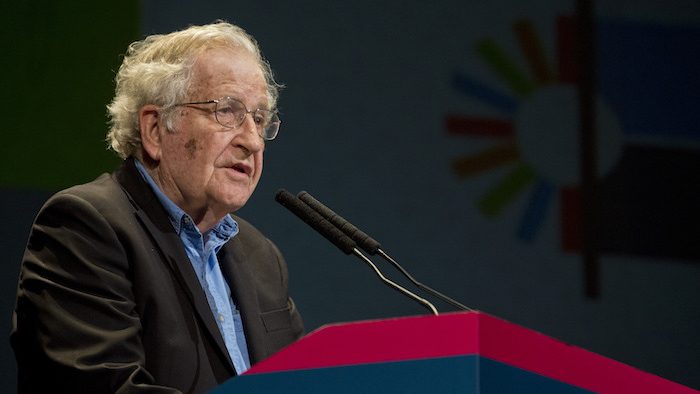E INTERNATIONAL RELATIONS
 Noam Chomsky
Noam Chomsky
Noam Chomsky is Emeritus Professor of Linguistics at the Massachusetts Institute of Technology. Seen by many as “the father of modern linguistics”, his work as a theoretical linguist from the 1950s revolutionized the field of linguistics by treating language as a uniquely human, biologically based cognitive capacity. Through his contributions to linguistics and related fields, including cognitive psychology and the philosophies of mind and language, Chomsky helped to initiate and sustain what came to be known as the “cognitive revolution.” Chomsky has also gained a worldwide following as a political dissident for his analyses of the pernicious influence of economic elites on U.S. domestic politics, foreign policy, and intellectual culture.
The author of more than 120 books, Chomsky is widely recognized as a paradigm shifter who helped spark a major revolution in the human sciences, and is one of the most cited scholars in the last few decades. His most recent documentary, Requiem for the American Dream, focuses on the defining characteristic of our time—the deliberate concentration of wealth and power in the hands of a select few.
How has the way you understand the world changed over time and what (or who) has prompted the most significant shifts in your thinking?
For better or worse, I’ve pretty much stayed the same throughout my life. When I was a child in elementary school I was writing articles for the school newspaper on the rise of fascism in Europe and the threats to the world as I saw them from a 10-year-old point of view, and on from there. By the time I was a young teenager, I was very involved in radical politics of all kinds; hanging around anarchist bookstores and offices. A lot concerned what was happening during the Second World War: the British attack on Greece and the atomic bomb I thought was shattering.
The things I consider inspiring is seeing people struggling: poor suffering people, with limited resources, struggling to really achieve anything. Some of them are very inspiring. For example, a remote very poor village in southern Colombia organising to try to prevent a Canadian gold-mining operation from destroying their water supply and the environment; meanwhile, fending off para-military and military violence and so on. That kind of thing which you see all over the world is very inspiring.
In your new documentary Requiem for the American Dream, you note that the driving down of tax rates and the outsourcing of lower-skilled jobs has exacerbated inequality in recent years. Both of these phenomena are arguably due to the pressures of globalisation, and so, is this period of rapid globalisation generally bad for workers?
They could be described as globalisation but it would be a mistake to do so. Globalisation can take all kinds of forms. For example, if there were anybody that believed in free markets they might take Adam Smith seriously. Adam Smith pointed out that the fundamental element of free markets is the free circulation of labour. We don’t have that. We have sharp restrictions on the movement of labour, and so, it not only means that working people can’t come to the United States to work, it means that privileged professionals, such as lawyers or CEOs, can set up protectionist barriers to prevent competition from abroad. Plenty of lawyers and doctors from abroad who are highly skilled could easily meet U.S. professional standards but of course they aren’t allowed in because professionals can protect themselves.
Globalisation could be designed so that it’s beneficial to the general population or it could be designed so that it functions along the lines of the international trade agreements, including the Uruguay Round, the WTO Agreement, NAFTA, the current Atlantic and Pacific agreements, which are all specifically designed as investor rights agreements, not even trade agreements. Very high protection for major corporations, for big pharmaceuticals, media conglomerates, and so on, and very high barriers through intellectual property rights. Devices that allow corporations, but of course not people, to sue governments action that might potentially harm their profits. That is a particular form of globalisation designed in the interest of the designers. The designers are concentrations of private power, linked closely to state power, so in that system they are consequences of globalisation.
E International Relations for more
via Z Net
